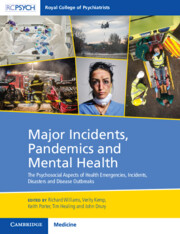 Major Incidents, Pandemics and Mental Health
Major Incidents, Pandemics and Mental Health Book contents
- Major Incidents, Pandemics and Mental Health
- Major Incidents, Pandemics and Mental Health
- Copyright page
- Dedication
- Contents
- Figures
- Tables
- Boxes
- Contributors
- Foreword by Dr Adrian James
- Foreword by Professor David Lockey
- Section 1 The Nature and Impacts of Twenty-First-Century Healthcare Emergencies
- Section 2 Clinical Aspects of Traumatic Injuries, Epidemics, and Pandemics
- Section 3 The Role of the Public in Emergencies: Survivors, Bystanders, and Volunteers
- Section 4 Responses to Meet the Mental Health Needs of People Affected by Emergencies, Major Incidents, and Pandemics
- Section 5 Sustaining and Caring for Staff During Emergencies
- Section 6 Designing, Leading, and Managing Responses to Emergencies and Pandemics
- Section 7 Key Lessons for the Way Forward
- Chapter 56 ‘Plans Are Worthless, but Planning is Everything’: Lessons from Science and Experience
- A Glossary of Selected Key Terms Used in This Book
- Index
- References
Chapter 56 - ‘Plans Are Worthless, but Planning is Everything’: Lessons from Science and Experience
from Section 7 - Key Lessons for the Way Forward
Published online by Cambridge University Press: 11 January 2024
- Major Incidents, Pandemics and Mental Health
- Major Incidents, Pandemics and Mental Health
- Copyright page
- Dedication
- Contents
- Figures
- Tables
- Boxes
- Contributors
- Foreword by Dr Adrian James
- Foreword by Professor David Lockey
- Section 1 The Nature and Impacts of Twenty-First-Century Healthcare Emergencies
- Section 2 Clinical Aspects of Traumatic Injuries, Epidemics, and Pandemics
- Section 3 The Role of the Public in Emergencies: Survivors, Bystanders, and Volunteers
- Section 4 Responses to Meet the Mental Health Needs of People Affected by Emergencies, Major Incidents, and Pandemics
- Section 5 Sustaining and Caring for Staff During Emergencies
- Section 6 Designing, Leading, and Managing Responses to Emergencies and Pandemics
- Section 7 Key Lessons for the Way Forward
- Chapter 56 ‘Plans Are Worthless, but Planning is Everything’: Lessons from Science and Experience
- A Glossary of Selected Key Terms Used in This Book
- Index
- References
Summary
The editors create an agenda of themes for developing services and practitioners, and for research capable of responding to psychosocial aspects of emergencies, incidents, disasters, and disease outbreaks (EIDD) and their deleterious effects. Topics include the perspectives of scientists, practitioners, and the public, the historical importance of how current capabilities have developed, the critical theme of agreeing definitions, recognising the wellbeing, psychosocial, and mental health agendas that face survivors of EIDD in their recovery, the fallacies of basing planning on panic and the belief that survivors of subsequent EIDD fare better than first timers, and the importance of good communication within and between agencies and then with the public, and of teams and their leadership. It recognises the lessons from the social sciences, and the importance of social support, psychological safety, and our relationships in our recovery. This book strongly supports the notion that there is no health without mental health.
Keywords
- Type
- Chapter
- Information
- Major Incidents, Pandemics and Mental HealthThe Psychosocial Aspects of Health Emergencies, Incidents, Disasters and Disease Outbreaks, pp. 423 - 437Publisher: Cambridge University PressPrint publication year: 2024
